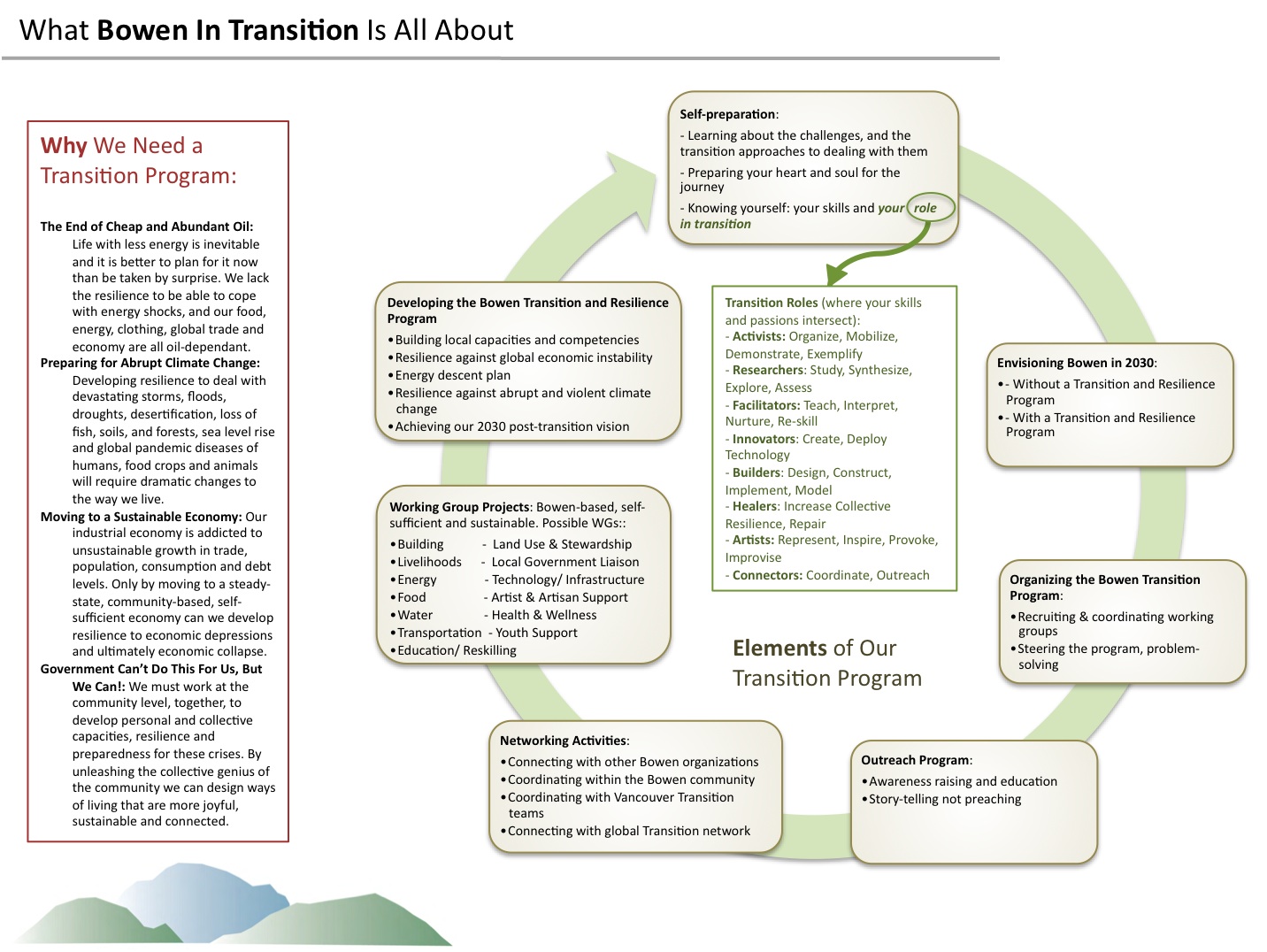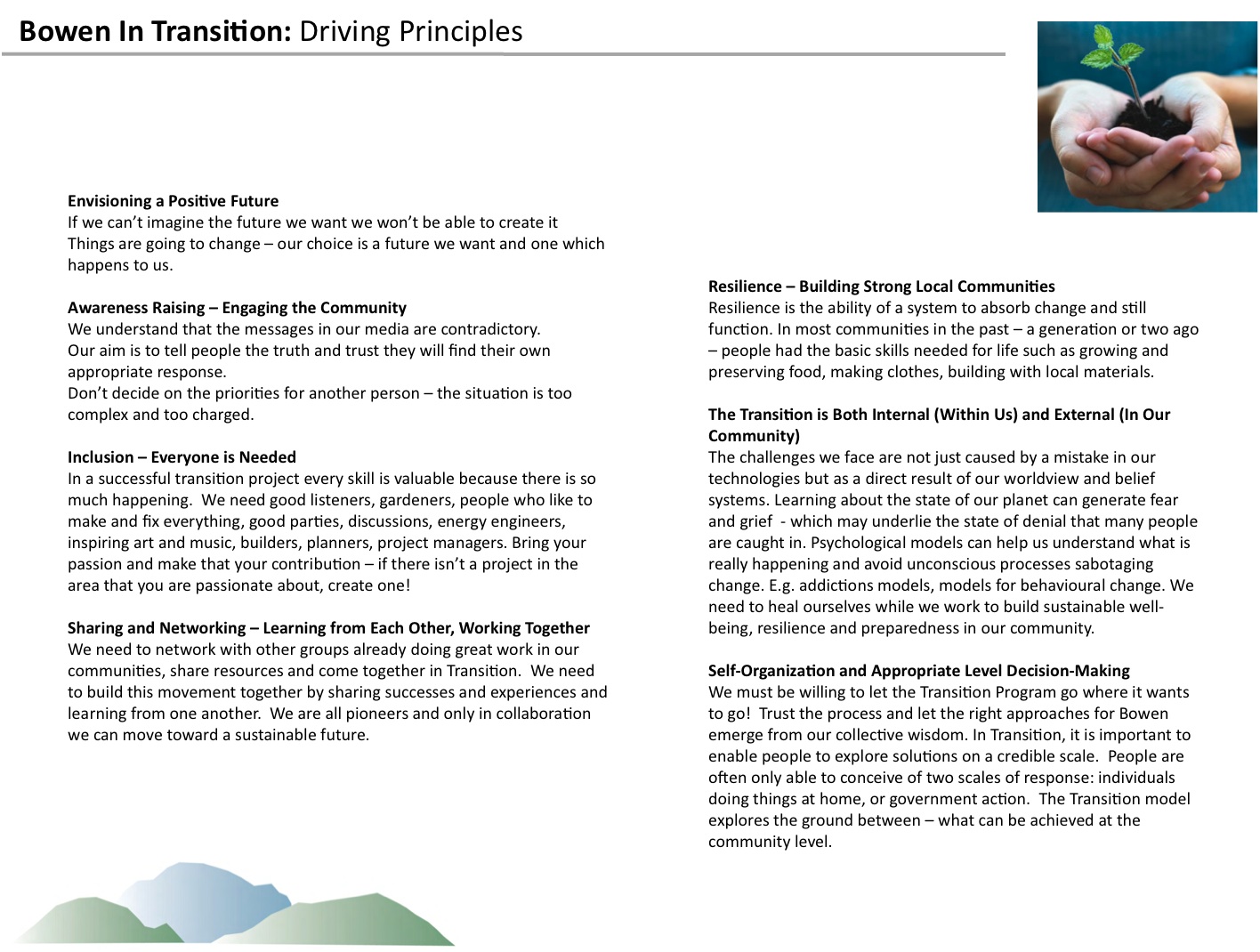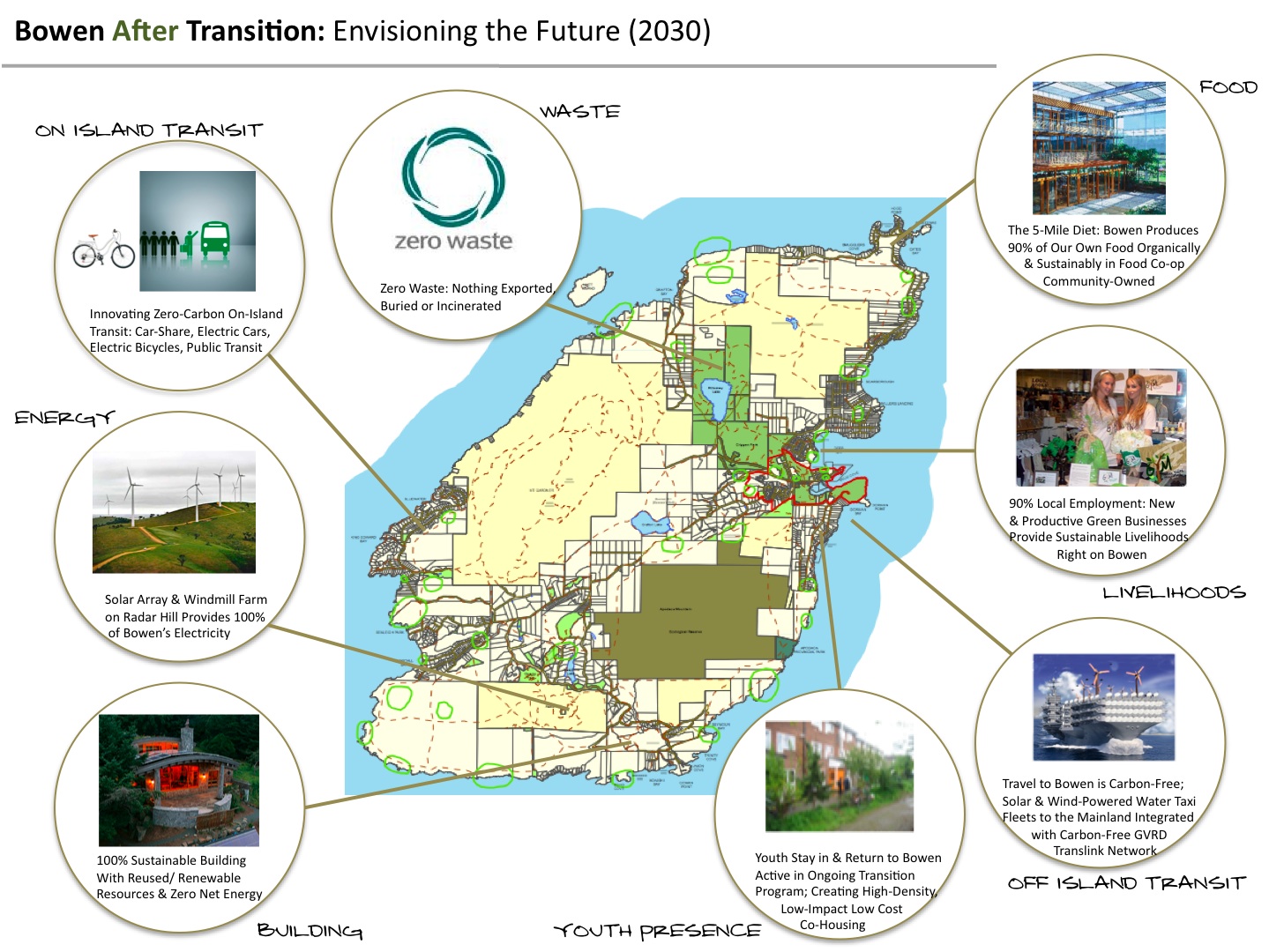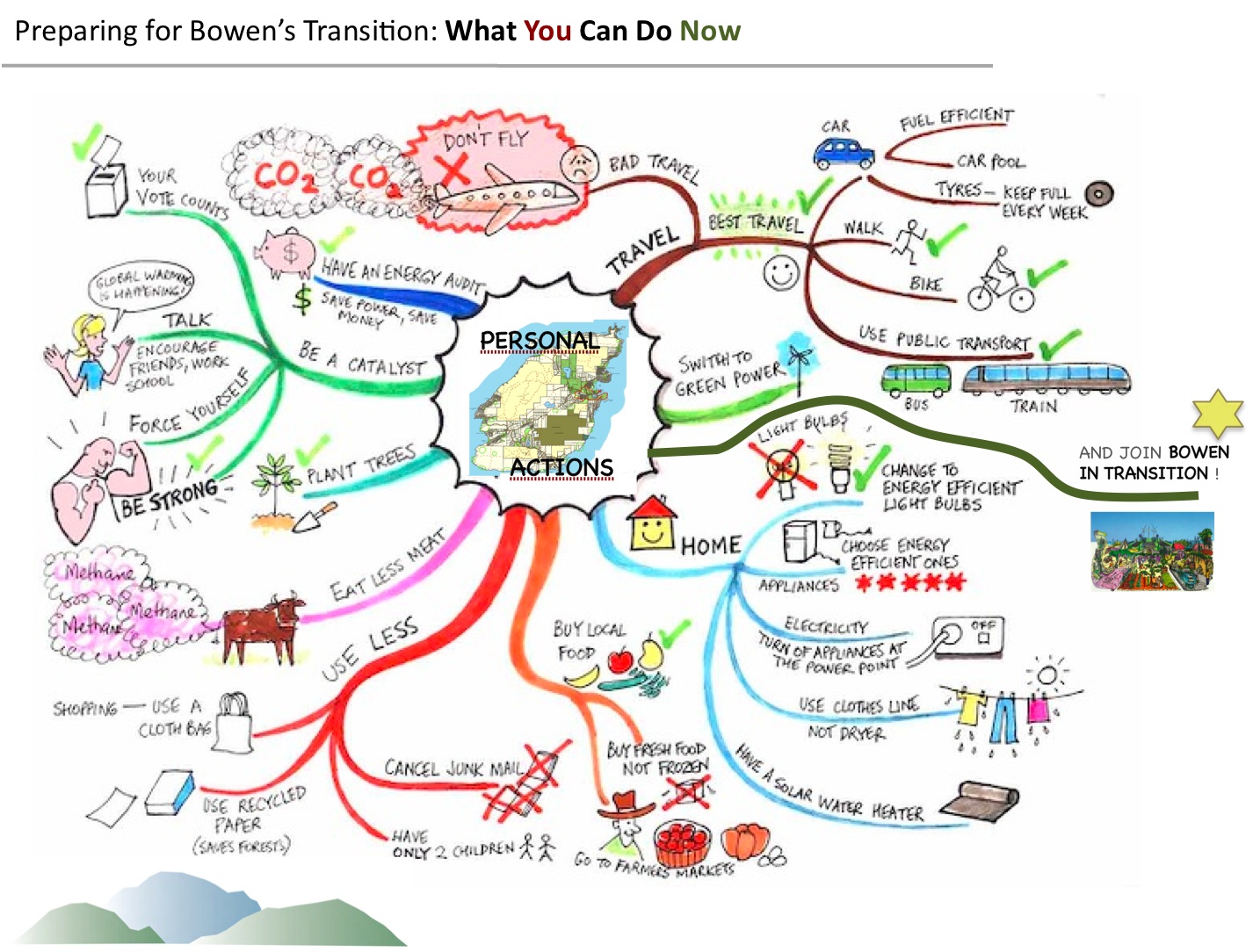Last weekend I attended the Transition Movement 2-day introductory training course in Vancouver, along with three fellow Bowen Islanders. We immediately and unanimously agreed to establish a “Bowen in Transition” chapter, affiliated with the Vancouver Transition network (called Village Vancouver).
For those who might want to know a bit more about the Transition Movement, here’s an overview of what we learned, along with a rough first cut at how we might adapt it to the needs of Bowen Island, where I now live.
The first part of the course provided the facts about our unsustainable energy, ecological and economic systems, and outlined the main elements of the ever-evolving processes and activities that communities around the world are including in their Transition programs. It also outlined why it is so important for communities to have a Transition program. Here’s a draft of a graphic that we might use to explain the purpose and key elements of a Transition program to the community of Bowen Island:
(click on any of the graphics in this article to see them full size — these are working drafts only and have not been approved by anyone)
We learned how the nature and composition of the Working Groups in any particular community will evolve to meet the unique needs of that community, and why it is unwise to try to formalize or top-down manage the Transition process using the initiating team’s preconceptions of what’s best for the particular community.
Next, we talked about the Principles behind the Transition movement, and our facilitators provided some insights for Transition program initiators about how to get traction in the community (make it fun, keep to the main messages) and how to deal with skeptics and deniers (just tell them you respect their ideas and move on; don’t waste time arguing with those not ready to listen). Here are the principles:
A significant amount of time was spent on the Visioning process – specifically getting your community to envision what life would be like (and how it would be different) if a Transition and Resilience program were developed now. I’m a great believer in future state visioning and scenario development as a means of getting people to really understand the purpose and value of acting now, and I was encouraged that the latest book by the Transition movement organizers is mostly focused on this visioning, and specifically on developing a timeline for future events, and how the Transition program can address, mitigate and help adapt to these future events.
Here’s a first cut at a future state scenario for Bowen Island (by contrast, Bowen is currently one of the most unsustainable and least prepared places for the challenges we face, that I know of):
What is missing here, I think, is the alternative business-as-usual scenario (with a few black swan events thrown in) to demonstrate why inaction is not an option. I’m hoping we’ll do that in the Bowen program.
Another thing missing is a process to help people bridge from the necessary but insufficient personal actions they are taking now, to the more comprehensive approach the Transition program embodies. Here’s an example of how one UK Transition Town (sorry, I’m not sure which one) is building that bridge, as we might adapt it to Bowen’s plan; this is all about encouraging people to continue personal actions rather than simply telling them what they’re doing is not good enough (and risking turning them off):
There is lots more in the Training for Transition course, which I understand is now being taught in countries all over the world. Much of the remainder of the course is focused on (i) the “heart and soul” issue (dealing with, and helping others deal with, the grief and sense of hopelessness that overwhelms many when they realize what is at stake and how hard the task ahead is, and (ii) how to initiate a Transition program in your community, traps to avoid, how to engage others, and how to “trust the process” to run without centralized management or hierarchy.
There were four issues that came up for me during the training, that were either very surprising or remain unresolved in my mind on how to deal with them; if anyone has any experience or thoughts on them, I’d welcome your comments:
1. The degree to which the program depends on acceptance of the Myth of Causality (that changes in beliefs will necessarily produce changes in behaviour and hence changes in results achieved by the program). My concern is that in many cases in complex systems I don’t think belief change is sufficient to bring about behaviour change, nor is behaviour change always sufficient to bring about significantly different results from business as usual. For example, many people have come to accept that significant climate change risks lie ahead, but believe there is nothing they can do, or that it’s governments’ job to “fix” the problem.
2. The claim that there is a Tipping Point beyond which a community consensus on the validity of assumptions and actions is sufficient to basically blow away the skeptics and deniers, and produce broad-based support for even radical projects and programs based on those assumptions or actions. The numbers tossed out for this Tipping Point were 15-20% of the population. I’m not so sure this is enough. In the US, a majority favour universal publicly-run health care and publicly-funded election campaigns, among many other progressive ideals, but inertia, and campaigns by a small but wealthy and powerful minority, have prevented any of these widely-supported changes from occurring.
3. How do we deal with the enormous challenges that we face in any attempt to bring about radical change quickly:
- most people’s addiction to the status quo (oil use, consumption and debt),
- endemic learned helplessness, fostered by those in power,
- most people’s sheer “busy-ness”, fear of insolvency, fear of unemployment, and fear of “not having enough” that prevents them working on anything other than family commitments and their exhausting jobs (working mostly for unsustainable employers)
- the propensity of anyone whose power is threatened to act quickly and violently to stop the change (Charles Handy, business consulting guru, famously said “No one willingly gives up power”), and
- Pollard’s Law, that says that despite what we believe should be done, it is human nature to exhaust all our time and energy doing what we have absolutely no choice not to do, doing what’s easy, and doing what’s fun; most Transition work doesn’t qualify by those criteria, and so it remains for most just a good intention, even among those who “get” the need for Transition.
4. My astonished realization that most young people attending the Transition training do not seem to feel the degree of grief, pessimism, and hopelessness that pervades the “heart and soul” of the boomers (who tend to make up the majority of Transition leaders, from what I gather). What is behind this generation gap – boomers’ exhaustion and cynicism, or young people’s naivety?
I think these four issues are absolutely critical to the success of the Transition Movement beyond its current early stages. Nevertheless, the momentum the movement has is remarkable, and it’s catching on all over the globe.
More on the subject of Transition as we move forward with our Bowen program.
Thanks to the course leaders Lena Soots and Bill Aal, their support staff, and all my fellow Transition training participants, especially Bowen’s Carol MacKinnon, Don Marshall, and Bob Turner.









Pingback: Tweets that mention Bowen in Transition « how to save the world -- Topsy.com
Hi Dave and other Transitioners on Bowen, from Transition Town Powell River!
I tried to think of some words of wisdom for you, but I seem to be all out of wisdom today :)
There are many other TI’s happening up and down the Coast, Gulf Islands and Vancouver Island, so don’t forget to hook up with us small places as well as Vancouver. TTPR’s blog is at
http://transitiontownpowellriver.ca
Kevin Wilson
Instigator, TTPR
Aggh, sorry, wrong post for that comment on G20.
But what if it wasn’t? Interesting posts recently by John Michael Greer on revitalisation movements in general, sometimes focussing on Transition Towns – it would be great to see some cross-fertilisation of thought there, particularly if you’re looking for pitfalls to look out for, I think his points go some way towards answering your questions.
Dave, welcome to the Transition movement! I don’t know how much the movement depends on “the Myth of Causality (that changes in beliefs will necessarily produce changes in behaviour and hence changes in results achieved by the program).” While Transition does include an element of “Awareness Raising” that might poke at beliefs, the strategy might not require any radical changes in belief. Many people will continue to believe in “democracy” and the capitalist economy, for example, even while they are attracted to localization for increased resilience, carbon neutrality, zero waste, alternative money systems, and so on. Quite a few will lend a hand merely out of a desire to build a feeling of community, a genuine connectedness with those nearby.
Will that be enough to cause the radical changes needed to mitigate our crises? Will we “tip” over to adopt a substantial critique of civilization? I really doubt it. Yet I’m somewhat hopeful that by alerting people to what’s going on, and by trying out some better methods of production and distribution on a much more local basis, many people will learn to imagine alternatives and will come to desire different relationships. That won’t solve most problems nor avert most catastrophes, but I suggest it could make for less distress as we tumble together down the slope of collapsing civilization. In other words, I don’t have much faith in Transition or in any other movement or process as the cure, but I’m heartened by its holistic approach, by its encouraging us to create a future, where we value our interdependence on other humans and the rest of nature.
I know you
The end is the beginning
We get to chose both, the end…..and the beginning
Arch
Pingback: Bowen For Pregnancy And Labour-Natural Pain Relief.
Love the personal actions chart! Should be a manifesto for mankind.
Pingback: who will qld selectors go with this year?
Not sure if it’s worth sharing, as you might already know, but thought you might find this interesting.
Apparently, a sustainable master plan was proposed for Bowen a few years ago (the most sustainable in BC!) and it was voted down:
SUMMARY
http://www.bimbc.ca/files/embedded/SC%20Master%20Plan%20-%20Executive%20Summary%20Jan%202008_1.pdf
SITE
http://www.bimbc.ca/current_topics_snug_cove_master_plan
VIDEOS
http://www.google.ca/search?q=bowen+island+master+plan+hotson+bakker&hl=en&client=safari&rls=en&prmd=vo&source=univ&tbs=vid:1&tbo=u&ei=4XIyTKrwD9_nnQePi4X5Aw&sa=X&oi=video_result_group&ct=title&resnum=5&ved=0CC4QqwQwBA
I’ll leave it to you to see how well this connects with your vision.
Marco
Best of luck with your initiative. In making the transition from where Bowen is now to the future how will you include the various institutions that make up your society? Consider the education, police, defence, health, social and emergency services etc. Consider the businesses that operate in your society, the various service and community organisations etc.
Clearly the whole of your society need to be included in the transition. In my experience a successful transition to a desired outcome needs a plan that is feasible. includes all those who have a stake in the future and you need access to adequate resources.
So far I have not learnt of any transitions that have made much progress, which is understandable. My own initiative is to lead a significant sustainability project while endeavouring to build community amongst our volunteers. There is no mention of any “Movement” and this way we are able to remain inclusive of all groups in our society.
Regards
Old Man Allan
Hi Dave:
I’m thrilled to read about Bowen in Transition. We, through Chelsea Green http://www.chelseagreen.com have all the Transition titles including their new one coming soon, Local Money. So all the titles are available through local booksellers and Canadian on-line retailers.I’ve been tracking Transition Towns in Canada as a result and belong to Transition Ontario plus am following other Transtion groups. There are more and more of them each month.
I’m glad to read that all is well with you on Bowen. Best, Sarah